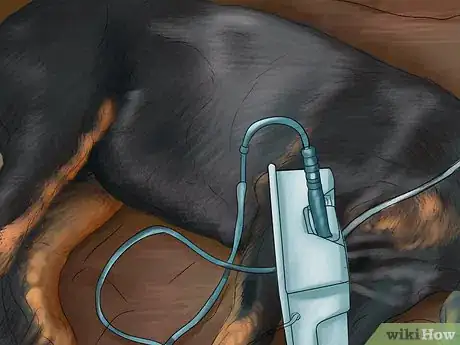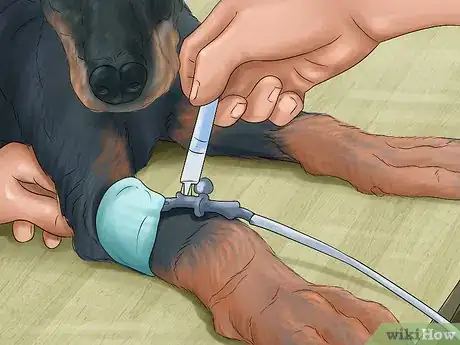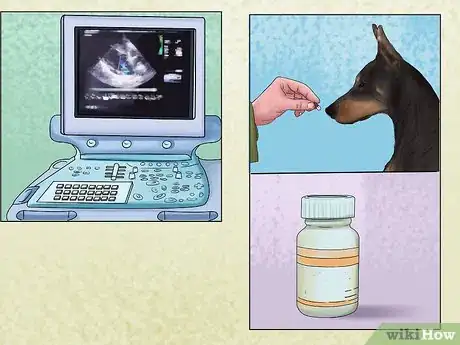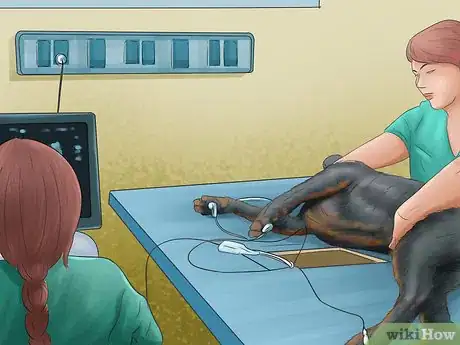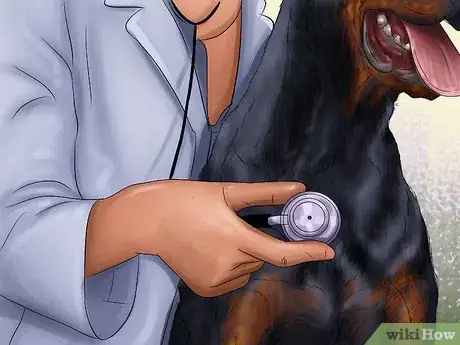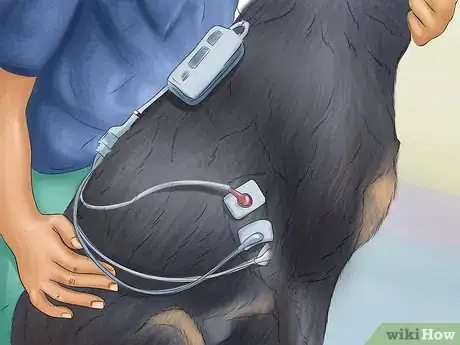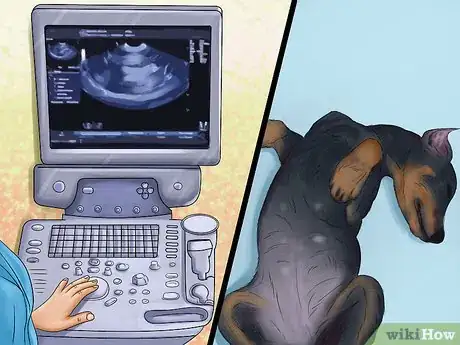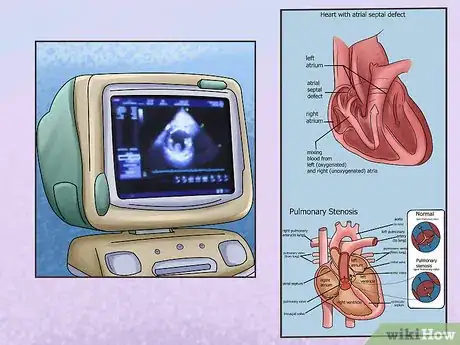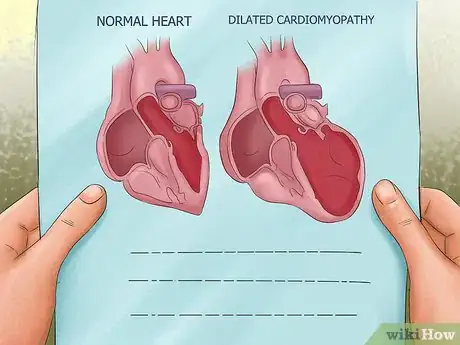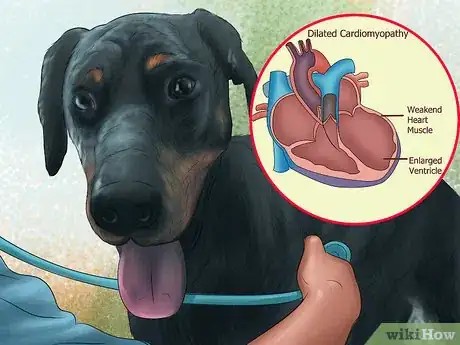This article was co-authored by Pippa Elliott, MRCVS. Dr. Elliott, BVMS, MRCVS is a veterinarian with over 30 years of experience in veterinary surgery and companion animal practice. She graduated from the University of Glasgow in 1987 with a degree in veterinary medicine and surgery. She has worked at the same animal clinic in her hometown for over 20 years.
There are 7 references cited in this article, which can be found at the bottom of the page.
This article has been viewed 12,016 times.
The Doberman pinscher is a breed strongly linked to a significant heart problem which shortens life and can cause sudden death. In Europe, statistics suggest that 50% of Dobermans suffer from dilated cardiomyopathy, which means if you own two dogs, the probability is one of them has this condition.[1] If you own a Doberman, you should be aware of the signs that your pet has heart problems so you can take him to the vet and keep him healthy.
Steps
Recognizing Symptoms of Heart Disease
-
1Monitor for respiratory distress. One of the symptoms of heart disease includes different respiratory problems. These respiratory problems occur because the heart has trouble pumping oxygen to the body and your dog's heart has to work harder to get blood flowing throughout the body.[2]
- Your dog may exhibit an unusual shortness of breath, rapid breathing, or labored breathing. If these symptoms persist more than a few days, you should take your dog to the vet.[3]
- Fluid in the lungs may trigger coughing fits, so your dog may also start coughing while he is at rest. If your dog coughs for more than three days, you should take him to the vet.
- Your dog also might start panting more than he used to.
-
2Look for a distended abdomen. Heart disease may cause your dog to have a distended abdomen. This is due to a build of of fluid in the area due to increased resistance to blood flow, causing fluid to leak out of the blood vessels and accumulate in the body cavities.
- The abdomen area may start to develop a pear shape. This is due to fluid building in the liver and abdomen area.
- If your Doberman has a distended abdomen, take her to the vet immediately.
Advertisement -
3Watch for behavior changes. Heart disease is accompanied by some behavioral changes. Your dog may experience weight loss. He may also be unable to exercise as he did before due to restricted oxygen flow. Because of the lack of blood and oxygen circulation, he may become tired sooner than he used to and be less active than he was before.[4]
- Some dogs also faint because of the heart condition.
- Many of these symptoms also point to other health problems, so if your dog exhibits any of these conditions, take him to the vet to get checked out.
-
4Know the age symptoms generally occur. The signs of heart conditions can occur at anytime, including when Dobermans are puppies. However, most signs start presenting between the ages of four to 10.[5]
- Symptoms can appear suddenly, which means your dog might go from being seemingly fine to sick very suddenly.
Diagnosing Heart Disease In Dobermans
-
1Screen your dog yearly. One of the problems associated with heart disease is that in the early stages, there may be no outward signs of a problem. This means the dog has to get regular screening tests in order to pick up signs of a damaged heart before the dog starts to struggle physically.
- Experts suggest once yearly screening with the dog wearing a 24-hour ECG monitor. This helps to pick up the earliest clues that heart problems may be present.
- This is important because researchers now have evidence that a drug called pimobendan, when given at the very earliest stage, can extend life.[6]
-
2Get a physical exam. If you notice any of the signs of heart disease, get your dog checked by a vet as soon as possible. This helps ensure your dog gets proper treatment. The vet will perform a careful physical examination of her to assess her body condition and to get an overall picture of her health.
-
3Have your dog's heart checked. As an initial assessment of the heart, your vet will listen to its beating pattern. Your vet will use a stethoscope to check your dog's heart rate, the heart rhythm, listening for murmurs, and making sure each heart beat is followed by a pulse in the back leg.[7]
- Listening alone is not sufficient to reach a diagnosis, but if a problem is detected, it raises the importance of conducting further tests. Clues such as a racing heart rate, skipped heart beats, or a heart murmur only develop once the heart has started to struggle, and so only appear in the more advanced stages of heart disease.
-
4Perform an extended test for the heart. To investigate further, the vet may run an ECG, which looks at the electrical impulses from the heart. This gives a detailed picture of whether or not the heart rhythm is abnormal.
- Before signs of heart disease are evident, a ECG is a good screening test to look for the disease.
- Since irregular heartbeats can be intermittent, a 24-hour trace of your dog's heart is needed before a dog can be given the all clear for that year. This means that your vet will equip your dog with a device like the Holter harness, which is a 24-hour monitor designed for dogs. Unlike an ECG or EKG performed in the vet office, a device like a Holter harness will continuously record the heart for 24 hours whereas an ECG usually only lasts for five minutes.[8]
- The gold standard for Dobermans is to have a Holter trace taken once a year when he is healthy so as to pick up the first signs early and start medication.[9]
-
5Run additional tests. In dogs that are showing physical signs of heart disease, the vet may take radiographs of the dog's chest. This gives information as to whether or not fluid is present in the lungs, which can help the vet decide on the most suitable medication for the dog.
- A cardiac ultrasound scan is a sensitive and invaluable way of monitoring the progression of the heart condition. It gives a 2D image in real time of the heart's contractions and allows the vet to take measurements, which show how efficient the heart is at pumping. The higher the measurements, the more serious the problem, and the measurements allow the vet to track progression of the disease.[10]
Understanding Heart Conditions In Doberman Pinschers
-
1Know what dilated cardiomyopathy is. Dilated cardiomyopathy is the most common and most serious heart disease Doberman pinschers develop. When your Doberman has dilated cardiomyopathy, her heart is basically like a balloon that’s been stretched and is lacking in tone. This means that the heart no longer has the elastic recoil it once had, which in turn means it's not so good at contracting to push blood around the body.[11]
- Dobermans can also have septal defects, valve disease, pulmonic stenosis, patent ductus arteriosus, among other heart conditions.[12]
- Having your Doberman screened for DCM will help your vet detect any other heart conditions as well.
-
2Understand this is a genetic condition. Dilated cardiomyopathy is a common condition for the Doberman. Unfortunately, it tends to be severe. It is a genetic condition, where affected parents pass the gene down to their puppies.[13] The condition is connected to genetic mutations in the Doberman pinscher breed.
- Breeders should not breed any dogs with known heart conditions, especially DCM.
- When you are buying a Doberman from a breeder, make sure to talk to the breeder about testing for DCM in the parent dogs.
-
3Be aware that no symptoms may present. Because of the nature of the heart disease in Dobermans, your dog may never show any symptoms. Sometimes, Dobermans will just die suddenly with no symptoms, or present symptoms and die very soon afterwards.[14] Death from heart disease can even occur in puppies or young dogs.[15]
- This is why it’s so important to get your dog screened so you can discover if he has heart disease and manage it before death or irreversible damage occurs.
-
4Know the treatment options. A variety of heart meds are available which can support the heart. However, there is no cure for dilated cardiomyopathy. Once a dog is diagnosed with DCM, the best case scenario is that drugs extend survival time and give the owner more good quality time with the dog before the inevitable decline occurs.
References
- ↑ http://www.ufaw.org.uk/dogs/doberman-pinscher-dilated-cardiomyopathy
- ↑ http://www.2ndchance.info/dogdilcardiomyopathy.htm
- ↑ http://www.ufaw.org.uk/dogs/doberman-pinscher-dilated-cardiomyopathy
- ↑ http://www.2ndchance.info/dogdilcardiomyopathy.htm
- ↑ http://www.2ndchance.info/dogdilcardiomyopathy.htm
- ↑ The Efficacy of Pimobendan in the Prevention of Congestive heart failure or sudden death in Doberman Pinschers with Preclinical dilated cardiomyopathy. Summerfield N, Boswood A, O'Grady M et al. J Vet Intern Med 26 (6) 1337 - 1349
- ↑ https://dpca.org/PublicEd/the-doberman/health/genetic-diseases/dilated-cardiomyopathy/
- ↑ http://www.albamedical.com/k9holteroverview.html
- ↑ http://www.vin.com/apputil/content/defaultadv1.aspx?meta=&pId=11149&id=3846592
- ↑ http://www.ufaw.org.uk/dogs/doberman-pinscher-dilated-cardiomyopathy
- ↑ https://dpca.org/PublicEd/the-doberman/health/genetic-diseases/dilated-cardiomyopathy/
- ↑ http://www.yourpurebredpuppy.com/health/dobermanpinschers.html
- ↑ https://dpca.org/PublicEd/the-doberman/health/genetic-diseases/dilated-cardiomyopathy/
- ↑ http://www.ufaw.org.uk/dogs/doberman-pinscher-dilated-cardiomyopathy
- ↑ http://www.yourpurebredpuppy.com/health/dobermanpinschers.html
About This Article
If you think your Doberman Pinscher might have a heart condition like heart disease, watch for unusual shortness of breath, labored breathing, or coughing when resting. Another sign you should look for is a distended or pear-shaped abdomen from fluid building up in the liver. In addition to physical changes, your dog might change its behavior, so be concerned if your dog is unable to exercise, suddenly loses weight, or randomly starts fainting. While all of these symptoms might point to a different health problem, you should still get your dog to a vet immediately if you notice any of them. For more advice from our Veterinary co-author, including how to treat heart disease in a Doberman Pinscher, scroll down.

